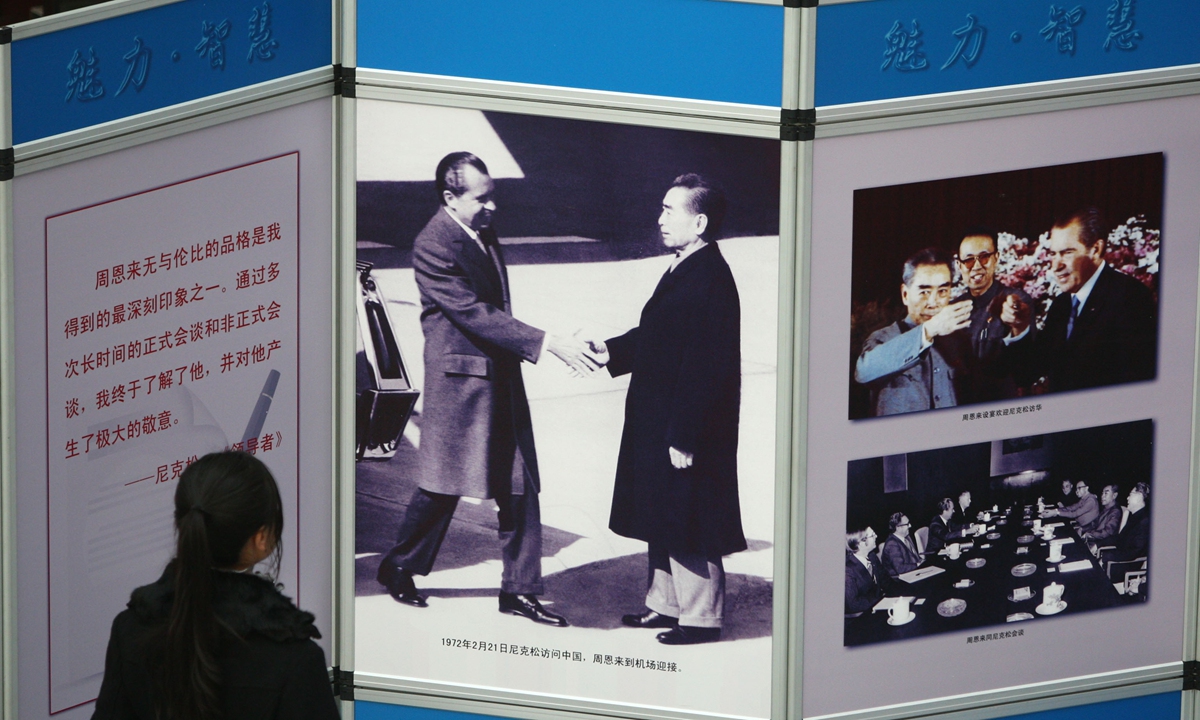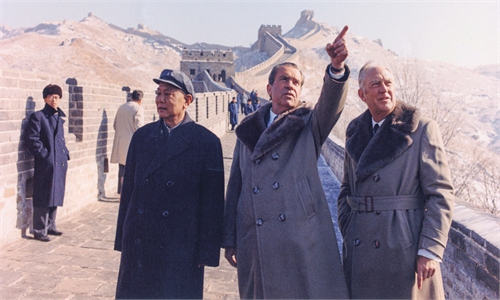50 years after Nixon's historic visit, China to be more connected with world 'but US could be more isolated'

An exhibition on US President Richard Nixon's visit to China Photo: cnsphoto
China has delivered its idea of "one world, one family" to show its sincerity in being and remaining open and inclusive, as well as its determination to be and remain more connected with the world through a remarkable Olympic Winter Games Beijing 2022. But the US, or at least its mainstream media outlets and some political elites, are questioning Nixon's decision to engage China, as they feel anxious about their unsuccessful strategy to compete with and contain China, with some of them trying to be as negative as possible in evaluating Beijing 2022, and many of them more interested in hyping concerns over war and the Ukraine crisis in continental Europe.
China and the US have stepped on different paths since they formally engaged with each other, said Chinese analysts. In the past five decades, China has always sought to develop its ties with the rest of the world, and the normalization of China-US ties is a key part of this effort, and China has been empowered by the world, and also contributes significantly in handling common challenges shared by the international community.
The US has greatly benefited from the normalization of China-US ties and emerged victorious in the Cold War, and has contributed a lot to the world by offering ideas, technologies and public goods, but it also refuses to stop seeking hegemony and tries to dominate the international order by force, and deals with China and Russia based on a hostile Cold War mentality.
Fifty years ago, during the Cold War era, China and the US both sensed the pressures and threats from the Soviet Union, and this became a key reason behind the handshakes between the leaders from two sides of the Pacific Ocean. But today, experts said, as China and Russia continue their close ties based on shared interests and views, it seems the US is the one walking on the path toward failure, just as the Soviet Union did: posing threats to the other two great powers at the same time; being aggressive in seeking hegemony or maintaining hegemony; trying to isolate the other two but eventually finding itself becoming isolated.
Wrong ideas
On the very day that marks Nixon's historic visit, China announced sanctions against two US military industrial giants - Lockheed Martin Corp and Raytheon Technologies Corp - over their arms sales to the island of Taiwan, which breaks the US promises over the Taiwan question made in the three China-US communiqués.
Fifty years ago, in Shanghai on February 28, 1972, the two countries signed the Shanghai Communiqué before Nixon concluded his China visit. One of the crucial achievements of the document was the two sides reaching key agreements on the Taiwan question despite differences that had remained.
The historic document "affirmed the one-China principle, which, along with the principles of respect for the sovereignty and territorial integrity of all states, non-aggression against other states, non-interference in the internal affairs of other states, equality and mutual benefit, and peaceful coexistence, constitutes the political foundation of normalization of relations and the establishment of diplomatic ties between the two countries," Chinese Foreign Ministry spokesperson Wang Wenbin said at a routine press conference on Monday.
"The US arms sales to the Taiwan region of China seriously violate the one-China principle and the stipulations of the three China-US joint communiqués, especially the August 17 Communiqué," Wang said.
Wang also said on the 50th anniversary of Nixon's visit, "The root cause of the current problems in China-US relations is that some people in the US, based on a seriously misguided perception of China, regard China as a major strategic competitor or even an 'imaginary enemy' and want to contain China in all dimensions."
A Beijing-based expert on international relations who asked for anonymity said that if some Americans believe that Nixon and Henry Kissinger were wrong "to open the door to China because it gave China the chance to challenge US hegemony" or the US got nothing good out of it, then "they are dead wrong."
The normalization of China-US ties and the "semi-alliance relationship" that the two sides were believed to have established from 1979 to 1989 played a decisive role in ending the Cold War, and without having cooperation with China, the US wouldn't have been able to end the Cold War in that way, and wouldn't have been able to open such a huge market for US companies to earn huge profits, while in 2008, China also saved the US from the financial crisis by purchasing huge amounts of US bonds, he said.
"How could some Americans say the engagement policy only benefits China? They don't have gratitude and fail to keep promises, but are becoming more and more hostile, and they break promises and keep provoking us on core interests like Xinjiang, Hong Kong and Taiwan, and launched wars in the fields of trade, science and technologies, as well as media. If they still don't know who should be blamed for the worsening bilateral ties, they are pretending to be blind," the expert noted.
Lü Xiang, an expert on US studies with the Chinese Academy of Social Sciences, told the Global Times on Monday that the US strategy is to prevent a great power from emerging in the Euro-Asia continent, so US strategists are still driven by such a mind-set, and those who believed it was correct for the US to engage with China 50 years ago may also support the idea of containing China today, because for these people, it's always about maintaining US hegemony, not stable and friendly ties with China.
Unlike their US counterparts, Chinese scholars are being honest by saying that China has benefited greatly from its ties with the US. Zhang Jiadong, a professor at the Center for American Studies, Fudan University, told the Global Times on Monday that "without Nixon's visit and the change in the US' China policy, China's reform and opening-up would have been unimaginable. At that time, without healthy China-US ties, the attempt at reform and opening-up would have been groundless and meaningless."
But today, "The US is no longer the path that China must pass through to connect itself with the world. Although China sincerely wants to repair ties with the US and continue making efforts to bring bilateral ties back on track, it's impossible for China to abandon its principles, core interests and development rights just to maintain 'good' ties with the US. So even if the US refuses to normalize the relationship, that's fine. China can keep marching on, and this won't stop China from deepening and expanding its connections with the rest of the whole world," Lü said.
Normalization again?
There have always been some rational voices in the West, even under the current extremely tense atmosphere, as some Americans have sensed that without China-US cooperation, there are many challenges today that they are unlikely to solve on their own, and the danger of a China-US conflict would be unimaginable.
Jeffrey D. Sachs, director of the Center for Sustainable Development at Columbia University, told the Global Times on Monday that "We [China and the US] should be restoring the spirit of cooperation. That is hugely important for both countries and for the whole world, especially when we face so many shared challenges, such as the pandemic, climate change, pollution, loss of biodiversity, and persistent poverty in a world of wealth."
"The difficulties lie in the misunderstandings between the two societies. The US public and political leadership understand remarkably little about China's great history and civilization. This is a real loss. The US attitude is also filled with arrogance, based on the idea that the US needs to be preeminent. We don't need dominance by any one country, but rather cooperation," he said.
Vince Cable, former business and industry minister of the UK, said during a recent debate at Oxford University on the ties between the West and China that the US needs to get used to a world in which it is no longer No.1 and respect China's development to surpass America to become the biggest economy.
"China has become a global and authoritative power. The United States has lost not only its former authority and influence in the world, but also a sense of responsibility for the fate of mankind," Victor Larin, an academician and principal researcher at the Russian Academy of Sciences, told the Global Times.
Wang Wenbin, the Chinese Foreign Ministry spokesperson, said that "an important inspiration from the Shanghai Communiqué and the 50th anniversary of president Nixon's visit to China is that countries with different social systems and development paths can expand common interests and coexist peacefully as long as they adhere to mutual respect and seek common ground while shelving differences and pursue win-win cooperation."
"We hope that the US side will work with China to draw experience and wisdom from the past 50 years, carry forward the spirit of the Shanghai Communiqué and bring China-US relations back onto the track of sound and steady development," Wang noted.
Lü said, "We believe one day that China-US ties will be normalized again. By that time, the US will eventually accept a world order that is not dominated by Washington. But we hope this process will be peaceful. We need to stay alert to the fact that the decline of US hegemony could bring chaos and wars."




